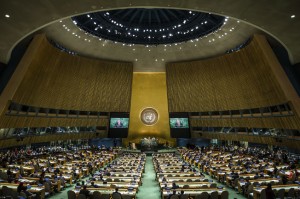Changes and Reflections: Rights of Nonbelievers Publicly Acknowledged at UN
 The UN General Assembly in New York.
The UN General Assembly in New York. Since the founding of the United Nations, the role of the United States has been to bolster its sovereignty by diplomatically rejecting the nativist impulses of dictators or their nationalist governments. Never perfect, but demonstrating how secular democracy can lead to peace, prosperity, and justice, the US has served at times as an aspirational moral good in terms of social attainment.
However, the United States is turning its back on international agreements and losing its moral and diplomatic voice concerning human rights, climate change, and denuclearization. What’s more, our rejection of bilateral commitments does not make the world safer, richer, or kinder.
In meetings at the United Nations this week, there seemed to be a certain filling of the vacuum left by America’s lack of leadership, especially for the rights of those who choose to be secular or who are outright nonbelievers.
I’ve certainly been critical of the UN in the past for not acknowledging the rights of atheists, humanists, and secularists. And I’ve been disappointed by the lack of diplomatic and moral outrage when states and communities use faith to harm others by disenfranchising, harassing, or, in extreme cases, killing people for their beliefs.
And so on Monday, after years of representing the AHA at the United Nations, I half expected another day without any recognition of humanism as a good and moral belief system to be respected and protected alongside any other philosophical system. I was pleasantly surprised when the special rapporteurs for 1) freedom of religion and belief, 2) minority issues, and 3) cultural issues each acknowledged nonbelief publicly.
The special rapporteur of minority issues, Fernand de Varennes, and I had a chance to talk frankly about his work prior to his presentation to the larger group. De Varennes explained that he’s a humanist and also shared his outlook as an optimist about how humanists can contribute to the security and safety of believers and nonbelievers alike. “We have to support the boots-on-the-ground activists,” he said. “These are the ones who are witnessing and advocating for themselves and others, even at risk of their own lives.”
Dr. Ahmed Shaheed, the special rapporteur for freedom of religion and belief, discussed how freedom requires acknowledgment of the individual within the collective. He noted that intolerance directed at anyone for their personal beliefs is a clear violation of their human rights to dignity and life, and he specifically mentioned humanism as part of those ideas that need to be protected equally.
It was the special rapporteur for cultural issues, Karima Bennoune, who perhaps spoke most clearly about protecting both individual and cultural rights and the UN’s mandate to protect everyone’s dignity regardless of religious belief or lack thereof. “Protecting cultural rights…without being relativistic…and supporting human rights is the goal of my diplomatic mission,” Bennoune said. She not only publicly supported nonbelievers and their cultural rights, but challenged humanists and atheists to support and protect the rights of others and their beliefs as well. “Universality is not a weapon against cultural diversity and cultural diversity cannot be a weapon again universality.”
So where do the affirmations made at this meeting take us next? How do we operationalize on a global scale the mandates, ideas, and details of the rapporteur’s findings? For humanists, I think we’re already there; I can think of no secular humanist organization or person who wishes to take away another’s freedom to believe what they wish, so long as those beliefs don’t harm or disable the rights of others.
The mantle of respect and protection is perhaps needed more today than ever. It is always necessary when those in power subject their fellow citizens or others to harassment, marginalization, and demonization.
We’re seeing this now in the Trump administration, and we must witness and fight it with words and nonviolent action. We see the fatalism of a growing cadre of leaders who are trying to demand compliance to their policies through the strength of force rather than the power of their words or the fostering of community.
A world without the United Nations would be a colder, darker place. We should praise these three special rapporteurs for their work and deeds.
